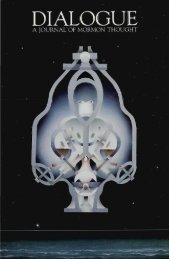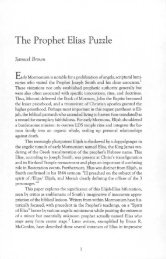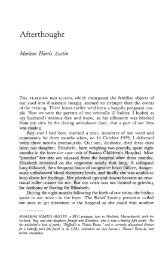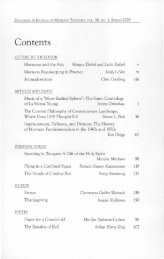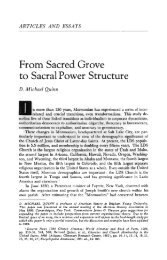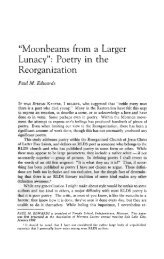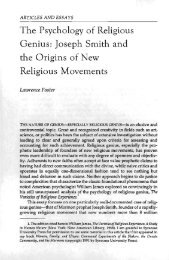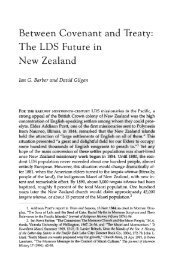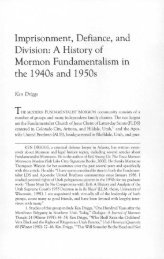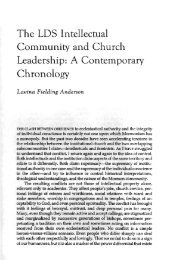Dialogue, Volume 25, Number 2 - Dialogue – A Journal of Mormon ...
Dialogue, Volume 25, Number 2 - Dialogue – A Journal of Mormon ...
Dialogue, Volume 25, Number 2 - Dialogue – A Journal of Mormon ...
Create successful ePaper yourself
Turn your PDF publications into a flip-book with our unique Google optimized e-Paper software.
Lindquist: The Bambara Mirror 65<br />
For us the ruling order is a white, Euramerican, middle-class,<br />
male-dominated, capitalistic system within which we have grown up<br />
and which therefore appears perfectly natural — thus God-created rather<br />
than manmade — though not many <strong>of</strong> us believe God personally provided<br />
us with language, the basis for law, interpretation, and symbols —<br />
hence, meaning. It is impossible for language and meaning to be fixed<br />
ideals, transparent to truth; they are dynamic like the people who<br />
write and interpret them, constantly changing and expanding with<br />
knowledge and cultural needs. And the people who control them control<br />
the culture.<br />
While we <strong>Mormon</strong> women might condemn Bambara women for<br />
permitting their daughters' sexual mutilation to continue, we, too, cooperate<br />
in shaping the language and culture that in turn shape us. As<br />
socially constructed beings, we, too, must negotiate for personal identity<br />
within our culture's bounds. And on the Ouelessebougou expedition<br />
<strong>of</strong> March 1989, we eight women contributed actively to male<br />
domination, as do our sisters in our own country, no less than the<br />
Bambara midwives who perform the sexual excisions in dirt huts with<br />
dull knives for economic, traditional, and social reasons.<br />
In the process <strong>of</strong> sorting out the implications <strong>of</strong> Bambara tradition,<br />
I recalled incidents and relationships from my notes that illustrate<br />
our group's participation in female suppression. For instance, the<br />
<strong>Mormon</strong> bishop's wife, having learned her part from many years<br />
<strong>of</strong> following direction and former models, played sentinel for her husband.<br />
Two <strong>of</strong> us in the group, reduced to six women when two departed<br />
earlier as planned, expressed not only grief but outrage when we learned<br />
<strong>of</strong> the culturally sanctioned genital mutilation. Our first impulse was<br />
to do something — anything — to stop it. Although vocal about our feelings<br />
in the privacy <strong>of</strong> our compound, we had sense enough to realize<br />
that revealing our knowledge and extending our anger beyond those<br />
walls would only result in our being expelled from the "garden."<br />
Nonetheless, when this newly observed, order-threatening<br />
"feminism" was exposed, the wife took it upon herself to keep the situation<br />
in order: "Don't you think we're being divisive, only talking to<br />
the women?" she said to us after we insisted on holding discussions<br />
with the Bambara women focused on their needs and issues against<br />
her husband's obvious wishes. "Shouldn't we give the men equal time?"<br />
Forming her objections as questions rather than assertions, she signalled<br />
her own uncertainty while remaining dutiful to her role.<br />
A guardian mentality assumes the position <strong>of</strong> surrogate super-ego;<br />
its function is to remind <strong>of</strong>fenders <strong>of</strong> cultural obligations, its "shoulds"<br />
and "should nots." It also reports to the patriarch when his presence is<br />
required to keep ideas in line: "Do I need to be here?" her husband



